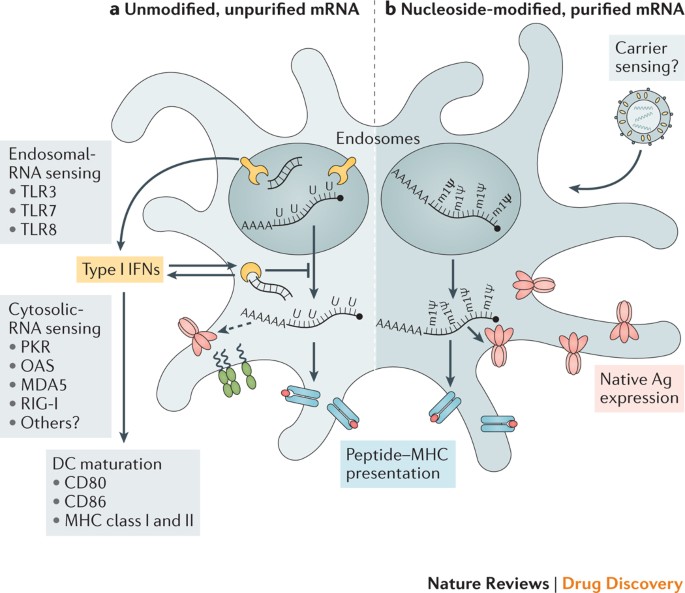For those further interested in the tech behind these new mRNA vaccines, here's a fairly technical article from before the pandemic era that gets into it:
mRNA vaccines represent a promising alternative to conventional vaccine approaches, but their application has been hampered by instability and delivery issues. Here, Pardi and colleagues discuss recent advances in mRNA vaccine technology, assess mRNA vaccines currently in development for cancer...

www.nature.com
While the COVID-19 mRNA vaccines are the first of their kind, and are new, they've been in trials since early 2020, so there is an ever-expanding set of data on their safety. No major concerns have arisen from the Phase II trials for Moderna or Pfizer, and those data sets go back a ways; the much larger phase 3 trials are also continuing to collect safety data that hopefully will give people confidence in their safety. There have also been trials, both human and animal, of other mRNA vaccines that were never deployed. So, there's actually a fair amount of data to look at, growing daily.
A good way to think about it is like this:
If you are diagnosed with COVID-19, there is something like a 1.5% chance you will die, based on current rates (not full historical, which was much higher). Obviously if you are old, fat, or immunocompromised, there's a much higher risk, and if you are young and healthy, a much lower risk. It's not just death to consider...
severe cases become common once you hit your 40s and even if you don't die, you might become seriously ill for weeks or longer.
Serious side effects from vaccines are generally measured in an event or two per 100,000 or per million. As an example, the long term serious side effect people often hear about from flu vaccines is Guillian-Barre syndrome,
which effects 1-2 people per million flu shot recipients. GBS is an autoimmune neurological disorder that most people recover from but can have permanent effects. So far there's no evidences that the mRNA vaccines cause GBS at all, and there's enough data so far to suggest it's not a major threat (more frequent than for flu) even if it happens at all.
My point is that there's a good chance I'll be infected with COVID sooner or later, and if I do, there's a solid chance I'll get a bad case (I'm 53) and a non-trivial chance it will kill me.
Since the vaccines seems to be 90-95 effective at preventing serious COVID cases and deaths, for me that outweighs any extraneous low probability risks that the vaccine may have. With the data we already have, it's definitely less risky than getting COVID, no matter how young and healthy you are.
I will get it as soon as I can. My wife, who is a health care provider, apparently is now eligible to get it and she is going through the signup process.
They say doctors make the worst patients. Maybe that explains the reluctance by a significant percentage of providers. The providers I know (friends and my own doctors) are all very pro-vaccination and are trying to set an example. Time will tell if the big picture changes or not.





